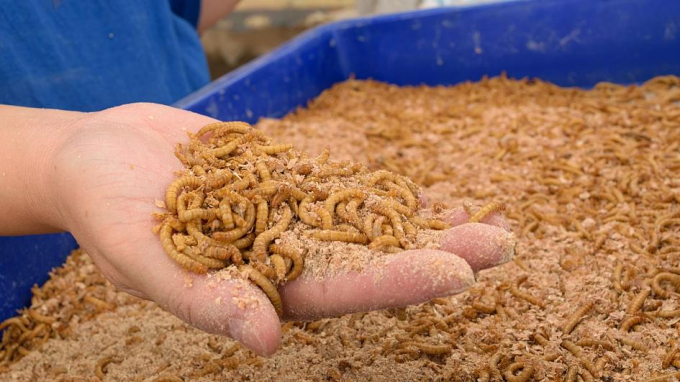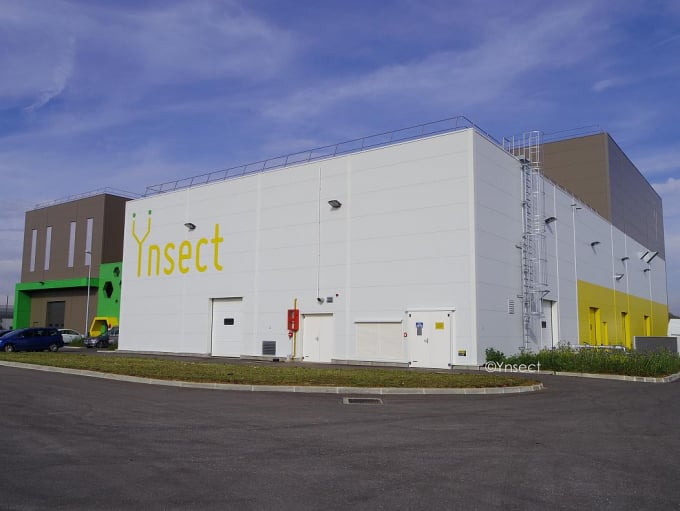November 22, 2025 | 02:56 GMT +7
November 22, 2025 | 02:56 GMT +7
Hotline: 0913.378.918
November 22, 2025 | 02:56 GMT +7
Hotline: 0913.378.918

The farm will produce mealworms as a low-carbon protein source. Photo: Getty.
While some are looking for ways to introduce them directly into our diet, the company behind the farm, Ÿnsect is focusing on ways to use insects to shrink the environmental footprint of agriculture.
The farmers believe that insects are a sustainable way to replace other animal proteins in the supply chain, by using them to feed fish and livestock or in pet food. The waste produced by the hundreds of millions of insects can then be used to fertilise crops.
“Our ambition is to revolutionise the food chain which, literally, starts from the basics: insects and soil,” says Antoine Hubert, co-founder, president and CEO of Ÿnsect. “It concerns all of us, whether we are meat lovers or vegans because it is how our plants and animals are fed.”
The company claims that by cultivating mealworms in their vertical farm, they can use 98 per cent less land and significantly reduce the carbon and biodiversity impacts of protein production.
The UN Food and Agriculture Organisation (UN FAO) predicts that by 2050, food production will have to grow by 70 per cent to meet the rising demands of growing global populations and increasing wealth. Most of the available land for farming is already being used, which means more innovative, sustainable solutions will need to be used for everyone to be fed.

Ÿnsect's first factory in Dole near Burgundy-Franche-Comté. Photo: Ÿnsect.
The project has some big backers too and Marvel star Robert Downey Jr. is one of them. He has launched an initiative to clean up the planet using artificial intelligence and technology, called the Footprint Coalition which has invested in the farm.
One of the uses for the company’s insect protein is for feeding fish. Farmed species, including salmon and prawns, are often fed using wild caught fish which puts more strain on the stocks left in our oceans. Soy is another option but imports of the protein-rich bean have been linked to illegal deforestation.
“Ÿnsect isn’t just about insect farming: with climate change and increasing populations worldwide, we need to produce more food with less available land and fewer resources, so that we’re not clearing forests and emptying our oceans,” concludes Hubert.
(euronews.com)

(VAN) In a new study published in Trends in Biotechnology, researchers used a gene-editing technology called CRISPR to increase a fungus's production efficiency and cut its production-related environmental impact by as much as 61%- all without adding any foreign DNA.

(VAN) A top official in Beijing’s Cop delegation says China is committed to clean energy – but US’s absence is a problem.

(VAN) The Bangsamoro region’s inflation rate rose slightly to –1.3 percent in October 2025 from –1.5 percent in September, the Philippine Statistics Authority (PSA-BARMM) reported.

(VAN) FAO-led report says protecting and restoring forests is crucial to boosting climate-resilient agriculture, rural livelihoods and global food and water security.

(VAN) Flagship partnership secures additional GBP 16.9 million to strengthen forest monitoring, transparency and country support to 2030.

(VAN) After a turbulent year for international development, the aid and assistance landscape has shifted, with donors rethinking how, where and why they support sustainable development.

(VAN) A new tool for measuring the economic value of farm animal welfare improvements has been developed, potentially transforming how consumers, retailers and the government evaluate animal welfare policies.